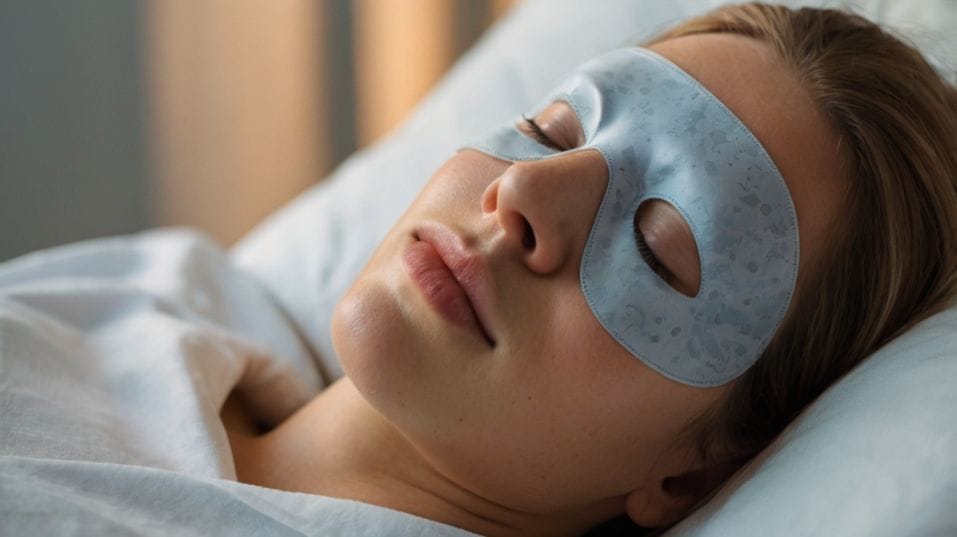Do Eye Masks Make a Difference for REM Sleep?
Discover how a simple eye mask can improve REM sleep, boost focus, and sharpen mornings—without tech, pills, or complicated routines.

Ever wonder why you still wake up drained—even after eight hours in bed? You might be sleeping through the night, but your brain could be missing the deep benefits of REM.
There’s a ridiculously simple fix that requires zero tech, almost no effort, and costs less than your coffee: an eye mask.
Backed by research, this small shift could mean sharper mornings, faster thinking, and better mood—all by blocking one major REM disruptor: light.
What REM Sleep Actually Does for You
You’re not just unconscious at night. Your brain’s busy running maintenance on your memory, emotions, and nervous system—and most of that heavy lifting happens during REM sleep.
This is when your brain processes information, resets emotional responses, and prepares you to focus and function the next day. REM is also linked to creativity, mood regulation, and long-term cognitive health.
If deep sleep is your physical recharge, REM is your mental reboot. Mess with it, and everything from learning to stress management takes a hit.
Prioritize it, and the benefits stack fast: clearer thinking, steadier moods, faster reaction times, and more mental stamina across the board.

Why Light Disrupts REM Sleep—Even With Your Eyes Closed
Your brain tracks light 24/7. Even when your eyes are shut, ambient light—streetlights, hallway LEDs, sunrise glow—can pass through your eyelids and signal the brain that it’s time to wake up.
That early signal shuts down melatonin production, fragments your sleep cycles, and limits how long you stay in deep or REM phases.
You might still log a full eight hours, but if that sleep is lighter or more fragmented, you’ll wake up feeling groggy. Worse, light-induced sleep interruptions often happen without you even realizing it.
A study published in Sleep found that nighttime light exposure—especially short wavelengths like blue and white—reduces REM duration and increases wakefulness throughout the night.
In contrast, blocking that light helps your brain stay in a more stable, restorative rhythm.
What Eye Masks Actually Do (and Why They’re More Than Just Comfy)
A good eye mask blocks out visual light completely, creating total darkness around your eyes. That blackout effect tells your brain it’s safe to fully relax.
With no light interruptions, your body can maintain consistent melatonin levels, which helps you cycle through deeper stages of sleep more smoothly—including REM.
And this isn’t just theory. A 2023 study in Sleep Research showed that participants who wore eye masks during sleep had better cognitive performance the next day.
They completed memory and reaction-time tasks faster and more accurately than those who slept without one.
The science points to real REM gains—and measurable next-day benefits. That’s not just “feeling better.” That’s sharper focus, faster recall, and better decision-making. All from something that costs less than lunch.
How to Choose an Eye Mask That Actually Works
Total blackout
The mask should block all light—even when you're facing a window.
Contoured shape
If you hate pressure on your eyelids or want to avoid smudging makeup during naps, go for a mask with molded cups.
Secure but breathable fit
You want it to stay put without creating heat or sweat buildup.
Durability
Cheap materials stretch out, pill, and degrade quickly. Aim for something you’ll still want to wear after 30 nights.
Bonus: some high-end masks now include cooling gel inserts or natural fabrics like silk to regulate temperature and reduce skin irritation. Not essential, but great if you’re chasing next-level comfort.
Eye Mask Habits That Actually Boost Results
An eye mask isn’t just for travel or naps—it belongs in your nightly lineup. Here’s how to build it into your routine:
Make it visible
Leave the mask on your pillow so it’s part of your wind-down ritual.
Use it for naps
Blocking light during short rest periods can still boost alertness and cognitive recovery.
Pair it with dim lighting
Set the mood in your bedroom an hour before sleep. The less contrast your brain experiences before masking up, the more effective it is.
Train your brain
At first, wearing a mask may feel weird. Stick with it for 3–5 nights. Your body will adapt—and start associating it with sleep, making the transition even faster.
This habit works even if you sleep in a "dark enough" room. Most bedrooms have more ambient light than you realize—from chargers, clocks, or traffic glow. If you’ve ever woken up around dawn before your alarm, light may be the culprit.
Real-World Wins: What You’ll Notice
Stick with an eye mask for one week. Here’s what’s likely to change:
- Faster sleep onset: Darkness speeds up melatonin production, helping you fall asleep quicker.
- Fewer wake-ups: You stay in deeper stages longer without light-induced disturbances.
- Better mornings: REM sleep in the later part of the night is critical for mental clarity. With more of it, waking up feels cleaner, less jarring.
- Improved focus: With enough REM, your brain processes information faster and resists mental fatigue longer.
- Emotional steadiness: REM plays a key role in regulating mood and stress responses.
These aren’t placebo effects. They’re brain-deep biological shifts driven by consistent, high-quality sleep.
Final Thoughts
If you’re trying to optimize sleep without overcomplicating your life, the eye mask is a no-brainer. It’s low-cost, high-impact, and works on night one. No tech. No side effects. Just more darkness and better rest.
You want real energy, mental clarity, and recovery that actually sticks? Start by taking light out of the equation.
Tonight, put on an eye mask. Let your brain do its job—undisturbed. You’ll wake up feeling the difference. Start now. Sleep darker. Wake sharper.




